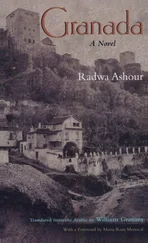‘Take the case!’
I didn’t notice Hamdiya there until she placed her own coat around my shoulders, with a large woollen shawl over it. She said, ‘Look after yourself.’ Her face was red, and wet with tears.
My father escorted me to the door of the building, where two police cars were waiting. They put me into one of them.
I hadn’t been afraid when they were coming into the house and searching it, nor did the appearance of the two armed security officers standing by the door of the flat frighten me, nor the three armed men I found unexpectedly at the bottom of the stairs near the entrance of the building. But when I was sitting between the two officers who had taken me in, watching the dark, deserted streets, I was engulfed all at once by a feeling that I was suffocating. I asked the one sitting to my right to open the car window. I didn’t tell him that I needed air in order to breathe, but this was in fact the case, no exaggeration.
Chapter ten
The Panopticon
It is fitting for me to open this chapter by explaining the title, which may seem cryptic and elusive, as well as hard to pronounce. Pan/opticon is Greek, actually a compound word the first of whose two components means ‘all’ or ‘the whole of’, while the second means ‘vision’ or ‘observation’. The expression is a term used by the English thinker Jeremy Bentham, in a report on prison reform which he published at the end of the eighteenth century. Bentham suggested that prisons be constructed so as to allow segregation of the prisoners, and surveillance of all of them by one or several guards. It was an economic project that would ensure through architectural methods a reduction in the cost of consolidating power whose hold on a large number of individuals requires dealing with them collectively.
The proposed prison would have a circular building consisting of several levels. On each level would be a number of adjacent individual cells, and at its centre would be a guard tower assuring continuous surveillance of all the prisoners, for each cell would extend lengthwise to the innermost portion of the building, from the façade looking toward the core housing the tower, to the outside wall of the prison. Each cell would have two openings, the first an iron-barred aperture looking on to the tower, and the second a window in the opposite wall to allow light to penetrate the cell so that the prisoner would be visible throughout the day to the guard on duty in the tower. Bentham suggested that the windows of the tower, in contrast to the cell windows, be enclosed with wooden screens, enabling the guards to see without being seen. He likewise proposed a design that would lay out the tower rooms in something much like a small labyrinth, preventing the prisoners from knowing by either sight or sound the position of the guard or in which direction he was looking. Thus it was all the same whether the guard was present or absent, whether he was conducting surveillance or not, for the presence of the guard would be a reality that the prisoners would internalise — it would be foremost in their consciousness and govern their conduct over the course of each day.
Bentham was well aware of the psychological and economic value of his invention, which he described as ‘a new mode of obtaining power of mind over mind, in a quantity hitherto without example’.
Bentham’s idea was regarded as a clear model for reform and was implemented in the construction of prisons, hospitals, schools, and factories; I encountered it in the course of reading another book sent to me by my mother when I was in the fourth year at university — Michel Foucault’s book Discipline and Punish: The Birth of the Prison.
From Bentham’s ‘Panopticon’, Foucault borrowed a metaphorical representation of the relationship between power and the citizens in modern society, and how power permeates their lives, to the point where it becomes a part of their very being, ruling them from within as well as from without.
Foucault begins his book with pictures of torture from a period prior to the eighteenth and nineteenth centuries: flaying, burning, severing of limbs — mortification of the flesh before and after execution, always in front of a crowd of spectators. Then he proceeds to the new reform that conferred absolute control upon those in power without its having to resort to exhibiting horrific scenes of torture, and thus without the need for punishment to be publicly witnessed. Foucault elaborates on his explanation of this political mechanism, advanced by power, in order to command the bodies of the people and thus bring them into compliance and submissiveness so as to make use of their energy: a political economy whose sphere of operations is the body of the citizen, its instrument a set of methods that have been studied, calculated, and well-organised — capable, without manifest violence or perceptible terrorism, of carrying out its mission with increased precision and reduced expense. For among the advantages of this technology was the difficulty of tracing it to any single aspect of power, or any precise apparatus or specific organisation within the overall matrix, for it would permeate the social texture, distributing itself throughout and penetrating so deeply into its soil that it would become one of society’s ongoing systemic functions.
Because in Foucault’s view modern society is a thing of shackling and punishment, the Panopticon is a metaphor for this society and its various agencies. Foucault says, ‘Why should we be surprised that a prison resembles the factories, schools, military barracks, and hospitals — which all resemble prisons?’
I was drawn into the book, even though I didn’t understand everything it had to say. In later years I would reread it more than once. Then I sought out Bentham’s book, so as to acquaint myself with his project directly, and this, too, I would read and reread. Each time, I picked up on something I hadn’t absorbed with previous readings, pausing at a paragraph in one book or the other, and lifting it out of its context as if it were a picture intended specially for me that I had clipped from a newspaper or magazine and saved along with my other personal pictures.
This is not the place to discuss Foucault’s book or Bentham’s, to reiterate what they said, or to try to draw a connection between them and my situation. What I wanted to point to is that the concept of the Panopticon opened a door for me, inviting me to contemplate — obsessively at times, at others less so — the relationship between us and power, the role of authority in either subjugating dissenters, or destroying them whether wholly or in part, and the possibilities for escape from its grip through some form of resistance.
Setting aside Foucault and Bentham for the moment, I focus my attention on the suicide of two of my comrades and the untimely deaths of dozens more. I mean death, literally, fate and divine decree, as when a person becomes ill, his condition worsens and deteriorates, and so he dies; or he’s not ill, nor does he show any sign of infirmity, until suddenly, without warning, his heart stops and he dies without knowing what hit him. I mean also the other death, metaphorical death, in which the body and spirit dissolve. The common element between the two is its premature occurrence, before the time when it would be normal and expected, before the person reaches an advanced age — say, sixty or seventy or eighty years.
I’ll jump now to the case file — I mean two national security cases: felony case number one, 1973, the high court for national security, District of Wayli 131; and felony case number 113 for the year 1973, national security, Giza. I say ‘the file’ for short, because the papers that were filed exceeded two thousand pages and comprised numerous dossiers, including charges filed by the secret service police, information obtained by the secret service on the detainees. There was a complete dossier on each girl or boy, starting with full name — consisting of several parts: personal name, surname, and sometimes two middle names that identified the individual’s father and grandfather — place of residence, college, and class-year. This was followed by a catalogue of the individual’s activities, a summary of his or her ideas, the wall-journals he or she had helped to edit, and sometimes a transcript of things he or she had said, whether at a conference, in a meeting, or in a private conversation. There was a file consisting of statements by witnesses for the prosecution (secret service officers, workers at the university, sometimes even professors and students), and still another file, a longer one, containing the interrogation of the suspects. Finally there would be the order to transfer the case to the high court for national security. In the first of these two cases the transfer order comprised a list of 56 suspects (students, male and female, from Cairo, Ain Shams and Alexandria Universities, as well as one male student from Al-Azhar and a male and a female student from the American University, in addition to a journalist, a poet, and two workers). The second case included 46 suspects (the accusation fundamentally revolved around the formation of a group of supporters of the Palestinian revolution. More than a third of the suspects were students from the College of Engineering at Cairo University).
Читать дальше











